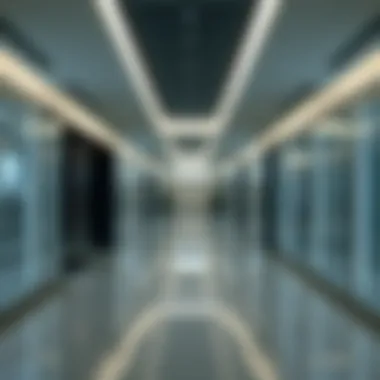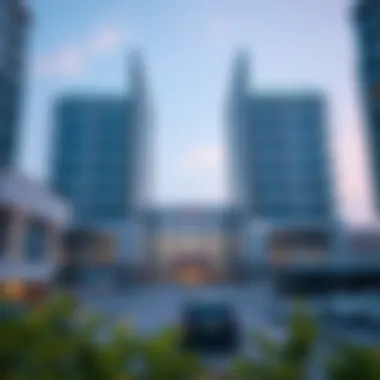Exploring Medical City Dubai: A Healthcare Revolution


Intro
Medical City Dubai stands as a beacon in the ever-evolving landscape of healthcare in the UAE. A blend of advanced technology, world-class facilities, and strategic partnerships, it serves not only as a hub for healthcare delivery but also as a significant player in real estate and investment opportunities. This narrative will walk you through the fundamental aspects of Medical City, offering valuable insights for a diverse audience—from investors and healthcare professionals to analysts and homebuyers. Expect a thorough examination of market insights, investment strategies, and future predictions that shape this vibrant healthcare ecosystem.
Market Insights
In recent years, Dubai's healthcare sector has been a pivotal focus for economic growth and urban development. Medical City Dubai, in particular, reflects broader trends in real estate, impacting both local residents and global investors alike.
Current Trends in Dubai Real Estate
Dubai's real estate market has witnessed fluctuations and resilience, influenced by various factors including global economic conditions, tourism rates, and healthcare investments. Some current trends include:
- Increased Demand: With an aging population and rising expatriate numbers, there’s a surge in demand for healthcare services, prompting growth in facilities within Medical City.
- Sustainability Initiatives: The economic vision of Dubai includes a focus on green architecture and sustainable practices, which permeates into the construction of new medical buildings.
- Technological Integration: Healthcare providers within Medical City are increasingly adopting telemedicine and smart health technologies, leading to improved patient care and operational efficiencies.
Property Valuation and Future Predictions
Analyzing property valuations in Medical City reveals promising future predictions for potential investors. Several factors contribute to this optimism:
- Proximity to Amenities: Properties near Medical City are seeing a rise in demand due to their accessibility to healthcare services. This leads to higher valuations.
- Foreign Investment: The UAE continues to attract foreign investors looking for opportunities in healthcare and real estate, likely inflating property values over time.
- Government Initiatives: Dubai’s government is committed to advancing the healthcare sector, which may lead to more favorable regulations for investors.
As the healthcare ecosystem grows, properties in and around Medical City are expected to appreciate, creating a lucrative investment environment.
"Dubai's healthcare landscape is not only vital for the residents but is also a key investment magnet on a global scale."
Investment Strategies
Investing in the burgeoning sector of Medical City Dubai requires an informed strategy. Here are some practical considerations for new investors in healthcare-related real estate.
Smart Investment Tips for New Buyers
To navigate this complex market, new buyers should consider the following tips:
- Research Thoroughly: Familiarize yourself with local regulations and market conditions. Knowledge is power in real estate.
- Engage Local Experts: Collaborating with local real estate agents who specialize in the healthcare sector can provide insights that suit your investment goals.
- Plan for Long-term: Properties in Medical City are not only an investment for today; they represent a vision for the future of healthcare in the UAE.
Understanding Rental Yields and ROI
Understanding the dynamics of rental yields is essential for gauging investment viability. Within Medical City, expect the following trends:
- Higher Than Average Returns: Due to the unique demand for healthcare services, properties can expect higher than average rental returns, especially in strategic locations.
- Long-term Lease Potential: Healthcare facilities typically favor longer leases, providing stability in rental income.
Investors can tap into the synergies between the healthcare sector and real estate, creating beneficial opportunities that promise robust returns.
By exploring the intricacies of Medical City Dubai, from market insights to effective investment strategies, one can grasp the compelling potential that this unique hub offers to a variety of stakeholders.
Overview of Medical City Dubai
Understanding Medical City Dubai is vital in grasping how this region stands at the forefront of healthcare in the UAE. This hub serves a clear purpose: to deliver world-class medical services, facilitate innovative health solutions, and foster partnerships that enhance the overall wellness of the community. In this rapidly evolving landscape, Medical City is not just a cluster of medical facilities but a comprehensive network designed to support an array of health-related services.
The strategic location of Medical City plays a crucial role in attracting both patients and healthcare professionals from around the world. As we explore its geographic advantages and accessibility, one can see how these aspects contribute to its allure as a medical haven.
Definition and Purpose
Medical City Dubai represents an ambitious vision for healthcare excellence in the UAE. It aims to consolidate various healthcare services under one roof, operating clinics, hospitals, and research institutions that work collaboratively. The idea is to have an integrated approach where the focus is not just on treating illness but also on promoting preventative care and wellness. This focus is especially important given the increasing prevalence of lifestyle diseases in the region.
By bringing top-tier talent and cutting-edge technology together, Medical City aims to attract medical tourists seeking advanced treatment options, which contributes not only to individual well-being but also to the national economy.
Strategic Location
Medical City Dubai is strategically situated, giving it a competitive edge in healthcare provision. The geographic positioning combined with its infrastructure makes it a prime site for both local residents and international visitors.
Geographic Advantages
The geographic advantages of Medical City are notable. Nestled within the urban expanse of Dubai, it sits close to major transport hubs, allowing easier access for patients and healthcare providers alike.
- Proximity to Major Airports: Being just a stone's throw away from Dubai International Airport allows for efficient transport of patients from abroad.
- Integration with Urban Infrastructure: The city’s excellent transport network supports swift movement to and from the area.
These factors contribute to a beneficial choice for individuals and professionals, establishing Medical City as a location ready to serve a diverse population and a melting pot of cultures.
Accessibility
Accessibility is another compelling aspect of Medical City Dubai. The area is designed to cater not only to local patients but also to medical tourists. It features convenient road networks, public transport options, and even provisions for parking, making it user-friendly.
- Transport Links: Buses and taxis make traveling to and from the city a breeze, further enhancing its reputation.
- Facilities for Disabled Patients: Accessibility for individuals with disabilities is prioritized, ensuring that everyone has equal opportunity to receive care.
This holistic approach to accessibility serves as an advantage, allowing Medical City to stand out as a premier destination for healthcare.


Medical City Dubai embodies a forward-thinking approach in healthcare, blending advanced medical practices with strategic location and accessibility. Its influence holds the potential to reshape not just individual lives but also the regional healthcare landscape.
Historical Development
The story of Medical City Dubai is one woven with ambition and innovation. Understanding its historical development is crucial as it sets the stage for the achievements and challenges that shaped the current healthcare landscape. This section provides insights into the inception of Medical City and highlights significant milestones that point to its growth trajectory. By exploring the formative years and pivotal expansions, readers gain a clearer perspective on how Medical City continues to influence healthcare not just in Dubai, but across the broader UAE region.
Founding of Medical City
Medical City emerged from a vision to enhance healthcare quality and accessibility in Dubai. The concept began taking shape in the early 2000s, rooted in the increasing demand for high-standard medical services among a growing expatriate population and local residents. Leaders in Dubai envisioned a centralized hub where advanced medical facilities could converge.
Reflecting on its foundation, it’s essential to note that Medical City was established not only as a response to rising healthcare needs but also to position Dubai as a leading medical tourism destination. When the Dubai Health Authority launched the project, it introduced a strategic plan to integrate various medical institutions under one umbrella. This would create a synergy that optimized resources and improved patient outcomes.
The opening of key facilities in 2008 marked the official inception of Medical City. Hospitals like the Dubai Hospital, and specialized institutions like Rashid Hospital were heralded as flagships of this initiative. These establishments focused on providing cutting-edge medical care, surgical services, and emergency response capabilities, setting a high benchmark for healthcare in the region.
Milestones in Growth
As Medical City started establishing itself, it didn't take long for the early steps to lead to major milestones. The period following its foundation saw an influx of investments from both local and international stakeholders. Here are some pivotal moments in its progression:
- Expansion of Facilities: By 2012, several new healthcare facilities opened, including specialized clinics and diagnostic centers catering to distinct medical needs. This development was not merely about quantity; it significantly enhanced the quality of available services.
- Integrating Modern Technologies: In 2015, the introduction of telemedicine service marked a significant innovation. Patients began receiving medical consultations remotely, addressing accessibility issues faced by individuals living in remote areas.
- Accreditations and Recognitions: Over the years, Medical City successfully obtained multiple international accreditations, such as those from the Joint Commission International (JCI). Such recognitions cemented its reputation on the global stage and encouraged continuous improvement in practices.
"In the pursuit of excellence, one must not only innovate but also adapt to the changing demands of society."
- Increasing Patient Volume: By 2020, patient visits had surged, with Medical City catering to a diverse demographic. This new era reflected growing trust in the healthcare system as well as increased awareness among the public about healthcare options available to them.
- Partnerships for Research: The establishment of research collaborations with global medical institutions in 2021 further boosted Medical City’s profile, focusing on developing innovative treatments and addressing public health challenges.
The historical journey of Medical City Dubai is not just a timeline of events; it underscores a collective commitment to advancing healthcare standards and patient welfare. Each milestone marks a step forward in establishing a robust healthcare ecosystem that serves the diverse population of Dubai and beyond.
Facilities and Services
The combination of facilities and services in Medical City Dubai plays a crucial role in establishing it as a central hub for healthcare in the region. A diverse range of medical services backed by world-class facilities not only enhances patient care but also fuels investment opportunities, making it an appealing destination for real estate and associated sectors. With the healthcare industry continually evolving, Medical City stands as a testament to innovative practices and a commitment to improving health outcomes across the board.
Hospitals and Clinics
Medical City Dubai hosts a variety of hospitals and clinics that cater to a vast array of medical needs. Each institution is structured to provide quality healthcare backed by advanced technology and highly qualified staff. Notably, hospitals like the Dubai Hospital and Rashid Hospital are among the key players, delivering specialized medical treatments across different fields including cardiology, orthopedics, and oncology.
- State-of-the-art Equipment: Hospitals are fitted with cutting-edge medical devices and surgical tools, ensuring that patients receive the best treatment possible.
- Multidisciplinary Teams: There’s a strong collaboration among medical specialists, which leads to more effective diagnosis and treatment plans.
- Accessibility for Patients: The hospitals in Medical City are designed to be easily accessible, a vital factor for emergency care services, especially for patients with urgent health conditions.
Hospitals and clinics not only focus on treatment but also on implementing preventive health measures, thereby fostering a healthier community overall.
Research and Innovation Centers
In Medical City, research and innovation centers are key to advancing healthcare practices. These institutions serve as incubators for developing new treatment methodologies and medical technologies. With partnerships linking global research entities and local institutions, the drive for innovation becomes evident.
- Focus on Clinical Trials: Many centers participate in clinical trials, which can lead to groundbreaking discoveries in health science. The outcomes feed back into both local and international healthcare practices.
- Collaboration with Universities: Strong ties with institutions such as the University of Dubai and others enrich the research undertakings. Students often get the opportunity to partake in real-world applications, providing a fresh influx of ideas and perspectives.
- Funding and Grants: Numerous health initiatives receive backing from both governmental and non-governmental organizations, promoting sustainability and further investment into technologies aimed at improving patient care.
The concentration of research initiatives not only enhances the standard of care but also positions Medical City as a pioneer in unearthing the future of healthcare.
Emergency Services and Patient Care
The emergency services within Medical City are a critical component, ensuring that immediate and critical care is accessible. The protocols established for emergencies are straightforward but effective, allowing for quick responses to various medical situations.
- Rapid Response Teams: Trained professionals are always on standby, guaranteeing that urgent cases receive timely attention. This can often be the difference between life and death in critical situations.
- Comprehensive Care Approach: Patient care extends beyond just the treatment of ailments; it involves a multifaceted approach that includes emotional and psychological support for both patients and their families.
- Integration of Technologies: Utilization of telemedicine and other tech solutions enhances how emergency services are delivered, enabling real-time diagnostics and patient tracking.
Emergency services safeguard the well-being of the community, ensuring that help is just a call away, reinforcing the city’s standing as a leader in healthcare.
Strong healthcare facilities and innovative services within Medical City Dubai not only serve patients but also drive economic growth and facilitate community health initiatives, resonating deeply with both local and international stakeholders.
As the healthcare landscape continues to shift, the facilities and services in Medical City Dubai remain trustworthy pillars of excellence that contribute to a holistic approach in addressing medical needs.
Healthcare Partnerships
Healthcare partnerships play a crucial role in enhancing the value and functionality of Medical City Dubai. These collaborations, whether local or international, not only improve the quality of care provided but also foster innovation and sustainability within the healthcare landscape of the UAE. Through strategic alliances, Medical City can leverage the strengths and expertise of various stakeholders, thereby ensuring comprehensive service delivery and a diverse range of medical facilities.
International Collaborations
International collaborations at Medical City Dubai are significant for multiple reasons. They open doors for knowledge transfer, bringing best practices from around the globe into the local context. For instance, partnerships with prestigious institutions in countries like the United States or Germany allow shared access to advanced medical technologies and innovative treatments.
Additionally, these collaborations often facilitate medical conferences and workshops, which elevate the educational standards for healthcare professionals in the region. When international experts share their insights and experiences, it raises the bar for local healthcare practitioners, leading to improved patient outcomes.
"The synergy created through international collaborations enhances the medical community’s ability to face global health challenges effectively."
However, there are considerations to take into account. Regulatory hurdles, cultural differences, and logistical challenges can sometimes complicate these partnerships. It’s essential for Medical City to navigate these aspects delicately to ensure that they maximize the benefits derived from such alliances without compromising on compliance or patient safety.
Local Medical Partnerships
Local medical partnerships are equally vital for the ecosystem at Medical City. Collaborations with local hospitals, clinics, and healthcare providers can foster a more integrated approach to health services. By engaging with entities like Emirates Healthcare and Seha, Medical City can streamline patient referrals, enhance communication between practitioners, and promote comprehensive care pathways.


These partnerships also support public health initiatives that resonate deeply with the community. For example, joint programs focused on preventive care or health education can effectively address prevalent health concerns within the UAE population, ultimately contributing to overall community well-being.
Moreover, working close to home allows Medical City to understand the unique health challenges that local residents face, which can inform better healthcare solutions tailored specifically to the community’s needs.
In summary, healthcare partnerships—both international and local—act as a foundation for Medical City Dubai’s operational strategy. They enhance service delivery, encourage innovation, and build a robust healthcare framework, making Medical City a pivotal player in Dubai’s healthcare landscape.
Economic Impact
The economic impact of Medical City Dubai extends beyond mere numbers; it shapes the very fabric of the emirate's financial ecosystem. This healthcare hub not only serves as a pivotal component in providing medical services but also positions itself as a catalyst for economic growth, job creation, and urban development. Understanding the various layers of its impact reveals insight into how healthcare and economy intertwine in a rapidly developing city.
Contribution to Dubai's Economy
Medical City Dubai significantly contributes to Dubai's economy through various avenues. For one, it generates employment opportunities, attracting healthcare professionals worldwide. The demand for specialized skill sets has led to a wealth of jobs not just in clinical roles but also in research, administration, and support services. The influx of talent fosters a competitive environment, enhancing the quality of care and innovation.
On the financial side, Medical City boosts local businesses and suppliers. When medical facilities acquire equipment or services, it stimulates economic activities within the region. The expenditure on healthcare not only promotes the sustainability of existing businesses but also encourages new investments. In addition, healthcare tourism plays a prominent role; foreign patients visiting for treatment spend money on accommodation, food, and various tourism services, which further enriches the local economy.
Real Estate Implications
As Medical City continues to thrive, its influence on the real estate landscape becomes increasingly substantial. The proximity of medical facilities attracts residential and commercial developments, creating a dynamic interplay between healthcare and housing. This synergy is vital for nurturing a holistic community where health is prioritized in urban planning.
Residential Developments
Residential developments near Medical City have become a preferred choice for many homebuyers. The key characteristic of these properties is their accessibility to world-class medical services. Families and individuals are more inclined to invest in homes where health facilities are readily available, making such developments exceptionally attractive.
Unique features like state-of-the-art amenities and wellness centers are often integrated, enhancing their appeal. The advantage of living close to Medical City includes peace of mind — knowing that medical assistance is just a stone’s throw away. However, one must also consider the potential cost of living in such prime locations, which can be higher than average.
Commercial Opportunities
Conversely, commercial opportunities surrounding Medical City are blossoming. The demand for healthcare-related services fosters the establishment of clinics, pharmacies, and wellness centers. The noteworthy aspect of these commercial developments is that they cater to both local residents and international patients, broadening their market potential.
The unique feature here is the multifaceted nature of businesses that arise; many commercial entities offer partnership opportunities within the healthcare sector. While this can lead to lucrative arrangements, challenges such as regulations and competition are also present. Nonetheless, the growing population and influx of visitors provide a steady customer base, ensuring viability for well-planned commercial ventures.
In essence, understanding these dynamics is crucial for investors and stakeholders keen on navigating the future landscape of Dubai's vibrant economy. The ongoing evolution presents both challenges and avenues for growth, ensuring that the relationship between healthcare and economic stability remains crucial for Dubai's future.
Regulatory Framework
Understanding the regulatory framework surrounding Medical City Dubai is essential for grasping the intricacies of its operations and growth within the healthcare landscape. The effectiveness of healthcare services depends significantly on clear regulations that ensure the quality and safety of care provided. This framework covers an array of guidelines that govern everything from facility accreditation to treatment protocols, ensuring overall compliance with international standards.
Regulations not only protect patients but also instill trust in healthcare providers and investors alike. A well-regulated healthcare environment is a breeding ground for innovation and stability, crucial for attracting talent and investment in the medical sector of Dubai.
Healthcare Regulations in Dubai
Dubai's healthcare regulations are designed to maintain a high standard of medical care while adapting to the unique socio-economic landscape of the region. The Dubai Health Authority (DHA) formulates these guidelines, ensuring they align with local needs and global healthcare trends. Some notable regulations include:
- Licensing: Healthcare facilities and professionals need to be licensed by DHA, preventing unqualified practitioners from operating in the medical city.
- Quality Assurance: Facilities undergo rigorous evaluations to maintain accreditation and certification, ensuring patient safety and care quality.
- Insurance Mandates: The city mandates health insurance coverage for residents, leading to increased accessibility for various medical services.
- Patient Rights and Safety: Regulations safeguard patients' rights regarding consent, privacy, and treatment options.
These regulations not only safeguard the public but also provide a clear roadmap for new entrants looking to invest and establish healthcare operations in the city. With the complexity of healthcare and its constant evolution, these guidelines need continuous updates to cope with new challenges and technologies.
Compliance and Standards
Compliance with established guidelines is not optional; it is a prerequisite for operational success within Medical City Dubai. Adhering to healthcare norms ensures a facility can deliver care that meets both local and international standards. Some key considerations include:
- Accreditation Bodies: Organizations like the Joint Commission International (JCI) set standards that facility must meet to gain accreditation, thereby enhancing their credibility.
- Training and Development: Continuous professional development for healthcare workers is mandated to keep abreast of the latest practices and technologies, reinforcing institutional credibility.
- Regular Audits: Periodic reviews and audits of healthcare services ensure ongoing compliance, thus preventing lapses that could affect patient care and safety.
"The backbone of a thriving healthcare system lies in adherence to regulatory compliance, ensuring quality, trust, and safety in patient care."
Investors and stakeholders find comfort in understanding that Medical City Dubai operates under a well-structured regulatory environment, where compliance translates to lower risks and higher marketability of healthcare services. Thus, the regulatory framework is not merely a set of guidelines; it forms the bedrock of Medical City’s reputation as a leading healthcare destination.
Future Trends
In the rapidly evolving landscape of healthcare, the future trends shaping Medical City Dubai are critically important. They not only influence the region's healthcare framework but also provide insights for potential stakeholders, including investors and professionals. Embracing innovations and projecting growth are essential elements that shine a light on the effectiveness and sustainability of services provided within Medical City.
Technological Innovations
Technological advancements are at the forefront of transforming Medical City Dubai into a leading healthcare hub. The incorporation of cutting-edge solutions such as telemedicine, artificial intelligence, and robotic-assisted surgeries is revolutionizing patient care. By utilizing AI-driven analytics, healthcare providers can improve patient assessments and tailor treatment plans more effectively.
Moreover, the integration of wearable health technology allows continuous patient monitoring beyond the hospital walls. This innovation ensures that patients receive timely interventions based on real-time data.
Here are some notable technological innovations shaping healthcare:
- Telehealth Platforms: Offering remote consultations, these platforms lessen the burden on physical facilities.
- AI in Diagnostics: Enhancing diagnostic accuracy through machine learning.
- Health Data Interoperability: Facilitating smoother information exchange between different healthcare systems.
The advantages of these technologies are manifold, ranging from reduced operational costs to improved patient engagement and satisfaction. As Dubai aims to position itself as a global leader in healthcare, the trend of blending technology with traditional practices is well on its way to becoming the norm.
Growth Projections


The forecasted growth for Medical City Dubai hints at a promising future within the healthcare sector. Reports suggest the market will experience a steady upward trajectory, buoyed by both local and international partnerships. The UAE's strategic initiatives, such as Vision 2021, emphasize innovation and quality healthcare, pushing Medical City to the forefront of development.
Potential growth areas include:
- Healthcare Tourism: With its world-class facilities, Medical City is set to attract patients from around the globe seeking specialized treatments.
- Pharmaceutical Development: A focus on research and development will likely see an increase in local production, reducing dependency on imported medications.
- Wellness and Preventative Care: Shifting focus from curative to preventive strategies enhances long-term health outcomes and alleviates healthcare costs.
By analyzing these projections, investors can tap into lucrative opportunities that extend beyond immediate returns. The future of Medical City doesn't just rest in infrastructure, but also in its capacity to attract talent and innovate consistently.
The importance of adapting to future trends cannot be overstated. It is the lifeline of sustaining and expanding Healthcare in Dubai, ensuring a diverse and resilient approach to health services.
Challenges and Opportunities
Understanding the challenges and opportunities within Medical City Dubai is crucial for various stakeholders, particularly investors and healthcare professionals. This section takes a closer look at the healthcare challenges faced in the region and the corresponding investment opportunities that arise from them. As the city evolves into a healthcare hub, recognizing these factors is essential for navigating the landscape effectively.
Current Challenges in Healthcare
Even amidst significant advancements, Medical City Dubai faces its share of challenges. With the demand for healthcare consistently rising, several factors come into play:
- Resource Allocation: The healthcare system is often stretched thin, requiring careful management of resources. Hospitals and clinics must balance between providing quality care and controlling costs.
- Workforce Shortages: Attracting and retaining skilled healthcare professionals remains a pressing issue, creating gaps in critical areas that affect patient care. The competition for talents is fierce, not just locally but globally.
- Technological Integration: While innovations are transforming healthcare, integrating new technologies can be stymied by existing infrastructures which are often outdated. Adapting to these advancements requires significant investment and training.
- Regulatory Hurdles: Navigating the complex regulatory environment can pose an obstacle for new entrants into the healthcare market. Understanding local laws and compliance requirements is essential, requiring expertise and resources.
Addressing these challenges effectively presents a unique opportunity to enhance the quality of healthcare delivered in the region, thus creating a better environment for all involved.
Investment Opportunities
The challenges within the healthcare sector also unveil several investment prospects that can lead to stabilization and growth:
- Health Technology Startups: The tech boom in healthcare has opened doors for investors interested in avenues like telemedicine, wearable health devices, and digital health solutions. Companies that address specific pain points often have substantial backing potential.
- Healthcare Real Estate: As demand increases for modern facilities, investing in healthcare-oriented real estate projects—like medical offices or senior living facilities—becomes increasingly important. Properties that cater to the growing population can yield significant returns.
- Training and Education: Investing in training programs for healthcare professionals could not only help mitigate workforce shortages but also create a skilled labor pool that benefits the sector as a whole. Colleges and training institutes focused on healthcare can be lucrative ventures.
- Partnerships with Established Players: Collaborations with existing healthcare institutions can offer strategic advantages. By tapping into established networks and resources, new investors can gain credibility and access to a broader market.
The evolving landscape of Medical City Dubai presents a promising canvas for investors willing to navigate the challenges and capitalize on emerging opportunities. A proactive approach to these dynamics can lead to a successful engagement in the flourishing healthcare sector.
Community Health Initiatives
Community health initiatives are critical in shaping the public health landscape within Medical City Dubai. They act as the backbone of healthcare delivery by emphasizing preventive care and promoting overall well-being. These initiatives not only address immediate health concerns but also foster a culture of health awareness and community engagement.
Public Health Programs
Public health programs in Medical City Dubai are designed to tackle prevalent health issues and enhance the quality of life for residents. These programs often include vaccinations, screenings, and community education designed to inform and empower the public about various health matters. For example, the Healthy Lifestyle Program encourages individuals to adopt healthier eating habits and engage in regular physical activity. By offering free workshops and seminars, these programs reach out to diverse demographics, from children to the elderly, ensuring that health education is accessible to all.
Key components of these public health programs include:
- Free Health Screenings: Regular screenings for conditions like diabetes and hypertension are provided to catch issues early.
- Immunization Drives: To prevent outbreaks of infectious diseases, the city runs frequent vaccination campaigns.
- Mental Health Workshops: Recognizing the importance of mental health, various programs focus on stress management and psychological wellness.
The benefits of these programs extend beyond treating health conditions; they create a ripple effect, enhancing community cohesion and reducing healthcare costs over time.
Awareness Campaigns
Awareness campaigns are another essential aspect of community health initiatives in Medical City Dubai. These campaigns aim to inform the public about pressing health issues, enabling individuals to make informed decisions regarding their health. The campaigns often focus on topics such as chronic diseases, mental health, and emergency response strategies.
One notable example is the Heart Health Awareness Month, which involves engaging visuals, informative pamphlets, and local events to highlight heart disease prevention strategies. These campaigns leverage social media platforms and community partnerships to maximize outreach and engagement.
Considerations for effective awareness campaigns include:
- Cultural Relevance: Tailoring messages to resonate with diverse cultural backgrounds in Dubai.
- Use of Multimedia: Engaging various forms of media to reach a broader audience, from videos to interactive posts.
- Feedback Mechanisms: Incorporating community feedback to continuously refine and improve campaigns.
"Investing in awareness not only saves lives but contributes to a healthier, more informed community."
With the growing trend of digital media, Medical City’s awareness campaigns also adopt innovative approaches, such as social media challenges and online webinars, to keep the momentum going and foster a lively dialogue about health.
Through these community health initiatives, Medical City Dubai establishes itself not just as a healthcare facility but as a proactive partner in public health, aiming for a healthier population and a robust community. The initiatives contribute significantly to the socio-economic fabric of Dubai, ultimately affecting real estate values and creating a vibrant, health-conscious community.
Epilogue
In wrapping up our exploration of Medical City Dubai, it becomes clear that this medical hub is not just a cluster of facilities and services, but a vital player in the global healthcare landscape. The role of Medical City transcends traditional healthcare; it’s pivotal for investors, healthcare professionals, and policymakers alike. One of the key elements that stands out is the integration of cutting-edge technology with world-class patient care, positioning Medical City as a beacon for medical excellence.
Recap of Medical City’s Role
From its inception, Medical City has undertaken the significant task of reshaping healthcare in the UAE. It encompasses a variety of hospitals and clinics that offer a breadth of services, from emergency care to specialized treatments. The partnerships established here, both locally and internationally, enhance its reputation and broaden the range of medical expertise available.
In recent years, the facility’s commitment to research and innovations has further solidified its standing. With the rise of technology in healthcare, Medical City continuously embraces new findings to ensure that patients receive not only the best treatment but also cutting-edge therapies that may have otherwise been available only in major Western cities. This strategic vision creates an atmosphere ripe for medical practitioners and health-conscious individuals seeking high-quality care.
Final Thoughts on Future Prospects
Looking ahead, several factors suggest promising growth for Medical City. The trends we see today hint at an ongoing investment in healthcare infrastructure, fueled by rising demand for specialized services. As more individuals flock to Dubai, whether for business or tourism, the need for a robust healthcare system will only increase.
In addition, initiatives aimed at enhancing public health programs reflect a growing recognition of the importance of community health. Such efforts not only serve to improve the overall well-being of residents and visitors but also make Medical City a more attractive option for potential investors seeking opportunities in a thriving market.
To summarize, Medical City Dubai stands poised as a pillar of healthcare innovation and excellence. Its role in the health landscape and its commitment to growth and improvement present an intriguing prospect for anyone considering involvement in the sector. This unique hub, with its future-focused approach, can potentially reshape how medical care is delivered in the region and beyond.
"A rising tide lifts all boats."
The advancements in Medical City offer remarkable opportunities to elevate the standard of healthcare, benefitting everyone involved in the ecosystem—patients, providers, and investors alike.











